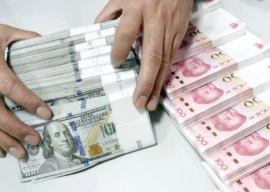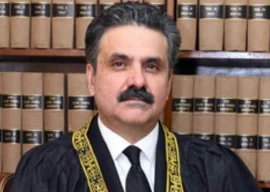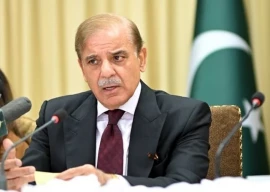
The Afghan president's trip, his second to India this year, comes after he accused Pakistan – India's arch enemy – of funding militant groups. Islamabad's relationship with key backer the United States has also soured.
Karzai was to sign a security agreement handing a greater role to India in training Afghan security forces and also seal two other deals covering energy and mining.
"This is a significant visit by the president and India is fully committed to nurturing our friendship and strategic partnership with Afghanistan," Indian Foreign Minister SM Krishna told reporters after talks with Karzai.
Analysts in India had predicted that Karzai would elevate New Delhi's role in stabilising his violence-torn country as he eyes a drawdown of US-led troops by 2014.
They argue that Karzai is losing patience with Pakistan, a key player in the region, and is instead looking for more support from New Delhi – something which is likely to rile Pakistan.
Krishna said that there would be one strategic agreement between the countries that "takes care of security" and two others to help the development of Afghanistan in mining and energy.
"Karzai's visit comes at a crucial juncture to endorse India's involvement in Afghanistan," Saeed Naqvi from the Observer Research Foundation think-tank told AFP.
"Karzai is coming to India to confer on India the tag 'reliable ally'... India will get the right to play a more pronounced role (in Afghanistan) after Karzai's visit."
The Indian Express newspaper reported on Sunday that the Afghan leader would sign a "strategic partnership" agreement with Singh, his first such pact.
Indian involvement in Afghanistan is extremely sensitive because of the delicate and often deadly power games in South Asia.
New Delhi, fearful of the return of an Islamist regime in Kabul, has ploughed billions of dollars of aid into the country to gain influence – raising suspicion in Pakistan, which views Afghanistan as its backyard.
But anger in Kabul about the recent death of former president and peace envoy Burhanuddin Rabbani – killed by a Pakistani citizen, according to Karzai's office – is seen as pushing Afghanistan further into India's orbit.
"After all the destruction and misery, the double game towards Afghanistan and the use of terrorism as an excuse still continues," Karzai said of Pakistan on Monday evening.
Krishna said the assassination of Rabbani and of Karzai's brother, Ahmed Wali Karzai, in July were "a grim reminder" to Afghanistan, India and the entire region of the need to fight militant groups.
Karzai will later Tuesday hold a press conference with Indian Prime Minister Manmohan Singh. On Wednesday, he is set to deliver a speech on "The Future of Afghanistan and South Asia."
Indian political analyst Subhash Agrawal, head of India Focus, a private think-tank, said the visit was "very significant in light of Afghanistan accusing Pakistan of being involved in the killing of Rabbani".
"This visit creates more of a natural window for India to have a sustainable role in Afghanistan post-2014," Agrawal told AFP.
Some analysts fear, however, that a greater role for India would lead to a more intense and dangerous "proxy war" between it and nuclear-armed Pakistan on Afghan territory, with unpredictable consequences.
New Delhi has repeatedly accused Pakistan of links to groups such as Lashkar-e-Taiba and the Haqqani network, which is accused of carrying out attacks in Afghanistan on Indian targets, including New Delhi's embassy in Kabul.
Any change in the Afghan-Indian dynamic also comes amid a sharp deterioration in ties between Pakistan and the US.
Washington has accused Islamabad of covertly funding militant groups in Afghanistan, while the killing of Osama bin Laden by US troops on Pakistani territory in May also hit relations.
C. Raja Mohan, senior analyst at the Centre For Policy Research in New Delhi, warned that neither India nor Afghanistan could afford to isolate Pakistan.
"Delhi and Kabul are realistic enough to know that there can be no lasting peace in Afghanistan without a measure of Pakistan's support," he wrote in The Indian Express.
COMMENTS (53)
Comments are moderated and generally will be posted if they are on-topic and not abusive.
For more information, please see our Comments FAQ



1730959638-0/trump-(19)1730959638-0-165x106.webp)













@alisarwar:
Including common cold and fever?
@Maxwell: the root cause of all these problems is the Kashmir issue. Pakistan does not have enough resources to overlook all the terrorist activities going on here. my country is in a state of war, america is always pushing Pakistan to do more. more than 75 percent of the attacks in Pakistan are planned in india by RAW, ISI has proof of it. and when the right time comes it will put them upfront. the weaponry that the Pakistan Army seized of in swat used by the Taliban was mostly indian weapons that are used by your army. these kind of reports do not go up on the international media or the indian media so you dont even know the half of it. indian nationals working close to pakistani border with afghanistan, what does that tell you? they train the taliban, they and the Israelis. its all a big propaganda.
Many guys don't know , the Earthquakes, floods in PAK are all of cunning India 's doing ...Beware my PAK friends, by training the Afghan police, India actually want to blast an atom bomb in Islamabad ..as if that won't be enough, India will send the slave Afghan police to invade PAK who will enter via POK after defeating Chinese army ..so shout at the top of your voice with a hope that Jehadees will at least come to your rescue...!
@ Dr.A.K.Tewari
Send your army to save your puppet Karzai; lets see if your army is worth the salt; Karzai & the gang dont need your best wishes or your money, they need your troops and army;
@Phannay Khan: Phannay Ji,
I hear a lot about Pashtoon and Pakistani machismo on this paper. What has Pastoon so-called victory over Soviets given to the common Pastoon man in Afghanistan/ Pakistan? Poverty, gun violence, American-NATO attacks and humiliation by American army, drone attacks, womens schools being blown up, etc. etc. You are English speaking elite Pastoon and maybe immune from all the troubles and talk about Macho Pastoon from begind compuetr screen. When you have to scrounge for a living then you will what Patloon bravado is doing to 90% of Pastoons. OK. Tank you
Eagerly awaiting Indian boots on Afghan soil to save our puppet regime in Kabul.
This is long overdue. But, due to the belligerence of Pakistan, Karzai had to do this.
Mind you India will only arm, support and build infrastructure with Afghanistan. Just like China has been doing with Pakistan.
With Pakistan heading towards isolation after 2014 and being majorly dependent on China, only, things are not looking bright for it.
The silent, yet the most important, aspect to this development is Iran's willingness to help Afghanistan and India grow closer. Iran is the gateway for India to Afghanistan.
The game is ON!
Let's see how this goes. I don't think this will do any good in this region. Afghanistan and India, both know the importance of Pakistan.
@Alisarvar: thank you Ali, for not having anything against Indian public, Indian public also does not have anything againt Pakistani public, it is proclaimed Pakistani govt policty of bleeding India with thousand cuts that our govt opposes and is trying to do all it can to safeguard growth of our economy and development of our country...I seems you are a smart man, you shoud be able to understand what we are talking about :) Govt of india is only doing its duty and if there were people like you in Pakistan, why did you not oppose your govt policy not to send continuous flow of terrorists to India and breed people like Hafiz Saeed? They say, you reap, what you sow...:)
Pakistan can ditch USA and start off with China, but Afghans should not, change! is it?
@Fareedi: Ketchup is not necessary to make a delicious sandwith. Anyway Pakistan import Tomatoes firom India anyway!!! How would you make Ketchup without India's Tomatos and Onions?
why is that even a news???Indians have sooo many strategic(anti-Pakistani) pacts/ties with Afghanistan that has brought millions in havoc in Pakistan.
@Diggvijay Singh: I want to ask you one question" When will you stop treating Afghans as slaves? And as for you identity we are sure you are not Indian. Kyon apney aap ko Pakistani kehtey huwey sharm aa rahee hai kyaa? Send me your Indian passport number on this forum asap.Diggy Baba jhootey mootey!
@Pashtoon:
Sir, remember, you will never be going to free from US
Our relatinn is going to be far better with Afghanistan than with Pakistan in a very short period due to the fact that we don't have any border dispute with that country and they support our stand on Kashmir issue .In the same manner India support their stand on Durand line . U.S was asking India to come openly to dismental the Taliban regime but it is just for the sake of Doller it prefered to support the U.S. action in Afghanistan ,In contrast to it India was willing to change the fanatic regime through democratic process but Pakistan was the main hurdle in this approach .Now the situation has changed and Afghanistan is no more a fifth state of Pakistan . It will now have a strong Afghan National army to protect their national interest and if Pakistan will not give land rute to KABULEE WALA to do business in India ,they can reach us via sea and air .,...,.,.? Our trio Khan ie. Salman , Amir,and Shahrukh are eager to welcome them at Bombay .Our relatinn is going to be far better with Afghanistan than with Pakistan in a very short period due to the fact that we don't have any border dispute with that country and they support our stand on Kashmir issue .In the same manner India support their stand on Durand line . U.S was asking India to come openly to dismental the Taliban regime but it is just for the sake of Doller it prefered to support the U.S. action in Afghanistan ,In contrast to it India was willing to change the fanatic regime through democratic process but Pakistan was the main hurdle in this approach .Now the situation has changed and Afghanistan is no more a fifth state of Pakistan . It will now have a strong Afghan National army to protect their national interest and if Pakistan will not give land rute to KABULEE WALA to do business in India ,they can reach us via sea and air .,...,.,.? Our trio Khan ie. Salman , Amir,and Shahrukh are eager to welcome them at Bombay .
Pakistan by playing double game both with US and Afghanistan for the past one decade has lost its credibility as well as the trust. No wonder Karzai is seeking New Delhi's assistance in strengthening the security of his country which India has readily obliged him in addition to several developments works, already going on in Afghanistan. So bye bye Pakistan, enters incredible India.
@Asim+Ali:
Good idea about thought leaders. Unfortunately, all thought leaders are fed up and left Pakistan some time ago.
@Pashtoon: Please don't. I am shivering just like Sachin shivered when he facing Shoaib Akhtar.
wake up people. our government lies to us and thats a fact, be it indian pakistani or afghan. whats really happening here is that india wants to "sandwich" pakistan, by having a influence on afghanistan. it kind of is the underground policy of RAW. i have nothing at all against the people of india, i just have a problem with the government of india and its policy towards pakistan. what it basically wants to do is that incase of a war(godforbid) it having a huge army and resources could either send its troops to afghanistan or just have enough influence on the people of afghanistan to have afghans start proxy warfare on the west of pakistan, so pak military would have to deal on both ends. it doesnt really look that way now (as this is just a pact) but this infact is the truth. once again i say i have nothing against the people of india its just indias policy towards pakistan. thats it.
Karzai's tilt towards India is very much similar to Pakistan's cozy relationship with China. He is following the old saying of Enemy's enemy is a friend. Besides unlike china we have helped common afghans not just the military. India has in the past specifically mentioned that we don't want any role in security of Afghanistan. The security arrangement should be restricted to training and intelligence sharing.
Let us suppose what will happen if Afghanistan Pashtuns unite under Afghan umbrella and create a havoc in Waziristan, 10 years from now.
PAK cannot isolate herself with her historical brothers. PAK has to think in 22 century terms. .
Pakistan has no compunctions about violating Afghna sovereignty. but go hoarse, whining about "Amrika" violating its sovereignty. What is sauce for the goose is sauce for the gander. Afghanis will not accept Pakistani puppets as their rulers. Afghanistan for the Afghans!
We defeated Soviet Union in Afghanistan. Now its America and India's turn. Be prepared. Great khair is coming.
Pakistan has no compunctions about violating Afghan sovereignty, but go hoarse about the US supposedly violating its sovereignty. Whats sauce for the goose is sauce for the gander. The Afghans dont want any Pakistani puppet as their ruler. The Taliban are a bloodthirsty band of religous fanactics. Afghanistan for the Afghans.
@Blithe: India wont mind those refugees coming here. We already have had huge population of afghans here and can take more. But your govt wont like to leave them, you see...it gets money from UN to support those refugies. so dont dream that you are feeding them...you are being paid for that...just like even for war against terror....
@Pashtoon...we are not happy or sad, these are just comments...What canPakistan give, and prices it can control, it has hardly anything. Its leaders have come to India begging for trade permission and favors at EU...huh
Karazai spoke marching all the way to Attock and threatening Pakistani Punjab in a book by the former British Ambassador to Afganistan.
May I remind Karzai that Afgasnistan cannot survive without the wheat from Punjab.
Dear Karazai,
Can you also please work to re-allocate the the 3.5mio Afghanis immigrants in Pakistan to India?
Your kind efforts on this score will be greatly appreciated.
There is a historic relation between Gandhar (Afghanistan) and Hindustan. Queen Gandhari, wife of Dhrutrashtra was from Afghanistan. Pathans are loved over in India. Film Kabuliwala was based on Pathan and was great hit.If Afghanistan and India want to increase their co operation let them.I request my Pakistani brothers and sisters bring your own country in proper order.Improve your trade with other countries.Do not depend upon some other country to to show US you stand high.You should have your own height to look in to other's eyes not crutches.
Afghanistan is a free country (not our fifth province), has the right to protect its interests and make alliance with any country of its choice. Afghanistan has been cornered by our Army's proxies and is ready to react in a strong way.
@rkfrom USA
And what about the US ?????, I'm sure there is more hatred towards US than Pakistan. Please visit the capital hill and give your advice to your law makers who are fooling American people on daily basis.
@Maryam: Yes, maybe India and Afghanistan should be best friends now. Shame they weren't best friends when the Afghan people were facing the storm of Communism and were being driven from their homes. Maybe they should have taken in the 3million+ afghan refugees, which Pakistan welcomed as our Muslim and Pashtun brothers. Maybe they could have been involved in the effort to drive the soviets out and train and help the mujahideen logistically and morally as Pakistan have done.
Pakistan is a country of 180 million, how it can be sandwiched? The majority of Population of Afghanistan are Pashtoon and have blood relation with the Pakistani Pashtoon. Afghani Pashtoon are extremely against of India just like the Pashtoon of KPK. So, All the above Indians, don't be so happy. We will make you sandwich, when we become free from USA.
And InshaAllah, with the help of Afghanistan's Pashtoon, we will get Kashmir, Gujarat, etc., from you. So, don't be so happy about the puppet visit to India.
Karzai is not the voice of AFGHAN people, he is a puppet, he rigged elections & is force on afghans.... we dont support his actions.... what will we do if PAK seals its border ... ordinary people have no idea where the prices of commodities will go....
@Digvijay Singh You really need to return to bharat-rakshak
Glass Afghanistan.
Thank you Mr. Karzai for back stabbing us but rest assured that we will still continue to shelter and feed your countrymen.
Tomorrow morning the comments section under this article will overflow ET's harddisk. One can find all emotions,(lament, happy, anger, desparation, exhaustion and what not). I can see lots of fume and smoke in Rawalpindi from where I am ( deep down in S India).
It seems to be like 'a blind leading a blind'
We are the ketchup without which the Afghan sandwich is in-consumable....don't worry... if the Taliban didn't surrender to USA u think they shall be shivering at the prospect of Indians training Afghan army.... hahaha....LOL
I am highly concerned that this is a blunder by our able and visionary Prime Minister Shri Manmohan Singh. This nurturing of friendship and strategic partnership with Afghanistan might offend the delicate sensibilities of Pakistani military officers and the network of elderly social and political activists in North Waziristan. I am afraid we have to begin the process of sending more dossiers to the esteemed Pakistani foreign office in very short time.
its become a norm by world leaders to accuse PAK of all the wrong doing before traveling to india...
It seems the end game is near. India is IN, Pakistan is OUT.
We lost strategic depth and now sandwiched to be sufocated.
why dont karzai learn that afghanistan even importa flour from pakistan actually not import but smuggled there at our expense he better try to get things calmed down with pakistan. rest is upto him he is the leader of the country.
I dont think our men from Kakul will be too happy about this. But then again, when one is to look at how they have shaped this country's policy, it is time to rethink, and reinvent this country called Pakistan. And this time, it should not be the men from Kakul redrafting our security and foreign policy. It should come from the business leaders, the intellectuals, foreign policy experts and other thought leaders. Time to stop living in the past and give rebirth to this country
Our TV Pundits blood pressure will hit insane levels tonight!